Music is great in that it doesn’t hold still. It commands the hell out of a room and disappears into the air. If you get sick of hearing a song for the one-thousandth time, there’s nothing really wrong with changing the lyrics or chords around either, letting your mind accidentally turn “All the very best of us string ourselves up for love” into “All the very best of us sing ourselves into a dove” and imagining a squirming and increasingly uncomfortable bird looking at you with widening eyes as you vocalize away into its feathers with a lack of reserve you typically reserve for a shower. Assuming you don’t also shower with a dove.
I’ve been thinking about music writing lately. I’ve been thinking about music reviews. I’ve been thinking about ethnomusicology beyond Alan Lomax, because, Jesus Christ, we should really move the collective conscious shorthand needle on that at some point, shouldn’t we? And I’ve also been thinking about what would happen if Robert Christgau and Greil Marcus ever decided to write a book together. Would it — say — alternate between short, concise chapters and oft-times fairly specious, wildly divergent ideations theorizing on the American experience? (Because, honestly: who opens a book by breezily attempting to compare “Like A Rolling Stone” to the assassination of JFK anyway? Should we be looking for a book comparing Nashville Skyline to the bombing of Osage Avenue next? Honest to God.)
And, by the way, one reason why I’ve been thinking about music writing is because I knew an Australian singer-songwriter by the name of Courtney Barnett was going to start to get big in December of last year and couldn’t find anyone interested in reading a profile of her, but also because — beyond the particulars of her life — once I had the chance in front of me, I didn’t know how to put what I wanted to say. I didn’t have writer’s block, but I found myself completely unable to avoid my inner-editor saying to myself, “Yeah, but … what else?” Because, I mean, really: what was I supposed to do? Hand out guitars to strangers and say, “Okay — Avant Gardener goes like this? And a-one, and a-two …”
So — and you can put the guitar down, by the way — it’s a good thing I’m at a music festival to put my thinking on music writing to the test — that is, Boston Calling, which stretched out over the course of three days in front of City Hall in Boston, Massachusetts that began with Future Islands singing about words jumping like salmon and splitting their pants on stage (“Let’s see if we can split ’em some more“) and ended with Nas dancing alongside The Roots and it being announced that Questlove was DJ’ing in Cambridge after the show, and, hey: why don’t we all go?
Perhaps the greatest surprise of the festival was White Denim, a four-piece outlet from Austin who consistently and regularly deployed the kind of guitar work that made me think of two dogs chasing each other at breakneck speed through a park that was initially started by Frederick Law Olmsted but was instead abandoned and handed over to M.C. Escher: consistently smart chord changes, solos, improvisations, and switches in time signatures that were a delight to listen to from start to finish, and, really, did it have to finish?
But my ears aren’t the be all and end all, because what do musicians hear that we don’t? Musicians are professional listeners, too, after all. You can’t be Spoon, The National, Lake Street Dive, or Nas without knowing how to seriously listen the way a painter knows how to stare down a painting until the colors and composition start to shift, move, and float.
So I asked some of the bands: “Is there anything you might be listening for when you hear other bands play at Boston Calling that you think other people might not be listening for themselves? What is it? Why should more people be listening for it?”
Sam Burke from CliffLight said that the band would “be listening for when Samuel T. Herring of Future Islands pounds his chest. You can hear it in the microphone. It’s the most thunderous kick drum of all time!”
And he wasn’t wrong. You could hear it. And, also, it’s worth pointing out: what little dancing everyone has seen of Sam Herring do on Letterman is a mere fraction of what the guy can do on stage. Watching Sam Herring dance is like watching Richard Burton release a dramatic interpretation of a Jane Fonda exercise video and everyone realizing it’s still the business. And, oh, that low, driving synthpop amongst a joyously Ashes to Ashes-styled jingle-jangle with the soul growling and soaring singing. And Burke wasn’t wrong to single out Future Islands for a bit of ‘guilt’ by association either: you could easily imagine Clifflight’s “Smokeshow” seguing into “Sun in the Morning.”
Bridget Kearney of Lake Street Dive told me that she “love[d] it when a band’s live show is really different from their album. There’s definitely a certain appeal to seeing your favorite musician perform a song in exactly the way you know and love it, but for me it’s more exciting when it’s something I’ve never heard before and couldn’t hear anywhere else that right there in that moment. One of my favorite shows so far from this summer was Lauryn Hill at Bonnaroo for that reason … Sometimes the song would be way faster than I knew it … or the drum beat would be completely different … or she’d be singing the melody over completely different chord … or the chorus would hit in a completely different spot in the form than it usually does. It completely blew my mind! Those kinds of surprises are one of my favorite things to listen for.”
And you could hear that exact kind of thing when Spoon took to the stage and took the bottom straight out of two parts of “The Underdog,” opting to build the song up again twice out of nothing but silence and Britt Daniel singing, and it worked.
Besides “The Underdog,” “Don’t You Evah” and “I Turn My Camera On,” Spoon also broke out “Rent I Pay” and “Inside Out,” and both “Rent I Pay” and “Inside Out” have this really neat “Oh, God, am I still dealing with time?” reaction that I like — because not only does “Time keep[…] going on when we got nothing else to give,” but “Ev-ery ki-nda for-tune gets old,” and it’s interesting to temporarily entertain the notion of both songs partly dealing with a kind of decisive exhaustion that hits you at forty (or thereabouts), too — he won’t be their soldier. He won’t be their dancer. He’s himself, obviously, and here’s the stomp of one song’s guitar to prove it, and he’s yours, too, your satellite, and here’s the Casio-like rising arpeggio floating up the staircase to bed or space or both to prove it as well. (And a night sky filled with floating and filled Antoine de Saint-Exupéry-drawn beds isn’t too terrible an image either.)
And, hey: is it too crazy an analogous leap to say that watching Neutral Milk Hotel play live is a little bit like watching Harper Lee tour and read from Mockingbird out loud? I suppose, but maintaining an accelerating musical chassis around the opening half of lyrics that bend and invert upon themselves the way “Holland 1945” does (and you can kind of hear that same general musical idea in Arcade Fire’s “Neighborhood #1,” too) is bound to leave someone searching for superlatives, because how can you get a song as good as that or an album as good as that after spending your time listening to — as Kim Cooper’s book on the band mentions — the Bulgarian Women’s Choir, Charlie Haden’s Liberation Music Orchestra, Pet Sounds, Smile, Os Mutantes, Pierre Henry, and Alain Savouret? I mean — you could imagine NMH covering “Bat Macumba,” sure, but the Bulgarian Women’s Choir? Maybe glancingly in the beginning of “The King of Carrot Flowers Part 2,” but, still: that wonderful elixir, and the mysterious bits that end up making the whole, and how great that is.
Think about Clifflight here, for instance. When I spoke to them after we finally found some moderate quiet in what I later found out was the media staging area (which … whoops), they told me they were listening to Young Thug, Octave Minds, Alex Ebert (of Edward Sharpe), and Chilly Gonzales, and how cool is it that those kinds of listening habits can atomize themselves, rearrange themselves, and partly add up to something like — in theory — “All The Things?”
But I was talking about Neutral Milk Hotel, and was about to talk about the fact that I had to look at the ground when they started playing “In The Aeroplane Over The Sea,” because that song is one of the few that can consistently gut-punch me, and I suppose it’s because “In The Aeroplane Over The Sea” always half-reminded me of Santo and Johnny’s “Sleepwalk.” Beyond the obvious fact that the chord progression for “Aeroplane” is a very 50’s-styled I-vi-IV-V, Santo and Johnny walk you up to the edge of sleep, and “Aeroplane” is the sleep. “Aeroplane” is the dream. The slide guitar steps into the dream and becomes — like Mr. Rogers’s trolley moving from the neighborhood to Neverland — the tremulously vibrating saw.
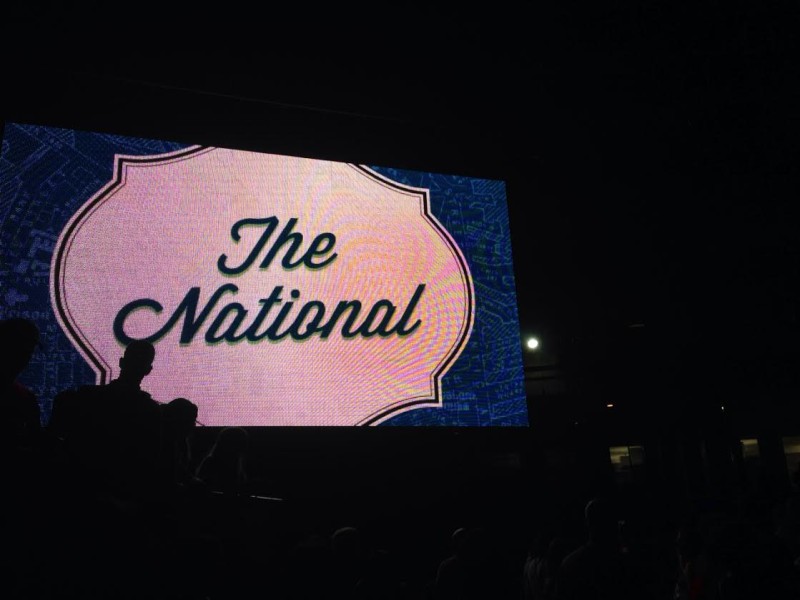
Though I could write a book about The National and the New Order-styled drumming and talk about how I used to joke around that The National wouldn’t be entirely out of place in Wings of Desire, patting someone on the back and saying after Bruno Ganz had come and gone, “Well, uh … I’m sorry you had a bad day in Berlin, too,” I’ll think I’ll limit myself to describing one of my favorite parts of their set — how I was off stage right by one of the LED screens, and how — come “Terrible Love” — Matt — as he has before at other shows — hopped off the stage and disappeared, and how a moment later, he appeared practically right in front of me, having passed through the gate that separated the festival from the backstage, and — for a moment — it seemed like he was surprised and baffled that there were so few people around him. The closest person besides myself and a handful of others was a young woman, so Matt did the gentlemanly thing, stuck his hand out, they shook hands and did a half-how-do-you-do sort of bow, and then he disappeared into the crowd, suppressing a bit of a giggle before he was swallowed up, as there were, of course, spiders to inform us about, and how there’s a kind of ocean out there that keeps us safe. And how sweet it is when the shivered bones bloom. (After all, he’s “walking in” for some reason, isn’t he?)
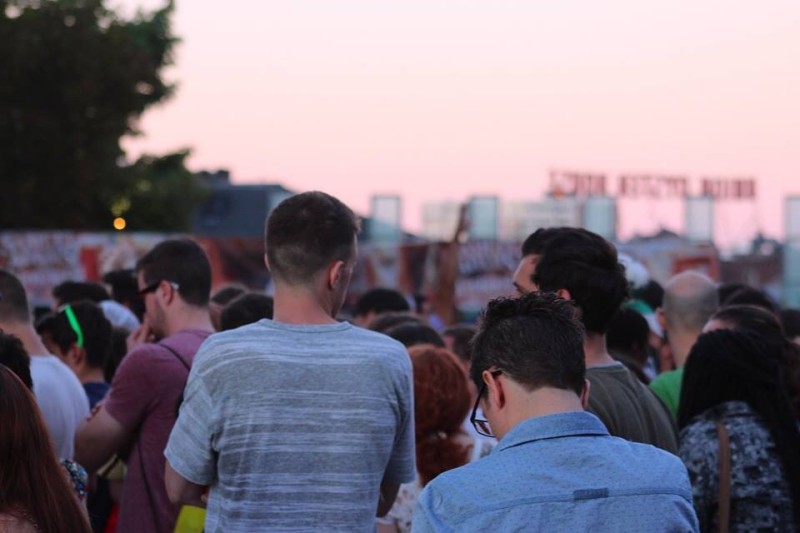
Then things happened quickly: the drummer for Twenty One Pilots thundered away. The 1975 pulled a young woman onto the stage for her own ‘Courtney Cox and Springsteen Dancing in the Dark’ moment. San Fermin knocked off a terrific horn-heavy swarm of a cover of “Heart in a Cage” by The Strokes. The Hold Steady played with this kind of quasi-Joe Cocker hands-thrown-wide sublime glee and The Replacements (The effing Replacements!) joyously bar-bellowed their way through a monstrous set that made me want to re-read Our Band Could Be Your Life all over again while The War On Drugs sailed expansively and broadly through theirs in a way that made you want forget about that book for a moment and just look at the corners of the surrounding buildings and walk slowly on by, and — of that latter, particular moment — what the heck is that? What’s the name of that feeling? Does anyone know? You get that feeling when you watch Solaris and watch Kris Kelvin drive into the city, too, but what is it? Because the bands weren’t exactly “Playing The Building” here a la David Byrne, were they?
I was also pleasantly surprised to see how well Boston-based Gentleman Hall (who specifically told me not to miss Clifflight, who — in turn — were eager to throw the attention back to GH) and Clifflight did, too. Gentleman Hall tried out songs they’d written specifically for festivals (“You’re our guinea pigs — of love”) and you could hear it when they sang about making themselves a king. (And, also: maybe it’s because I still had the previous night’s music in my head, but I realized at a certain point — maybe it was during their cover of Kendrick Lamar — that a collaboration between Gentleman Hall and Childish Gambino wouldn’t be a terrible thing at all.)
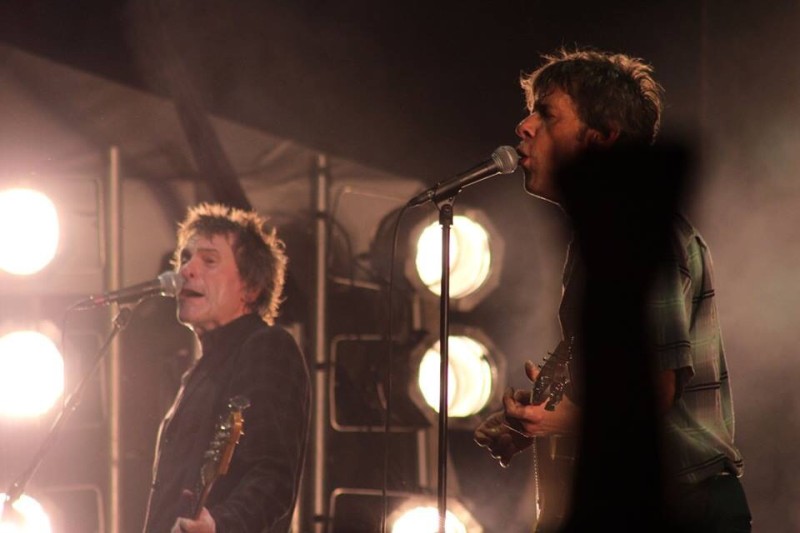
The Replacements
Thunder and lightning and the kind of wind that knocked off hats and kicked up dust to the height of small waves put the concert on hold on Saturday. Kids scattered. Some took refuge across the way from City Hall underneath that awning-like concrete underpass and sat down up against the walls in a way that ended up reminding me of a bus stop. The escalators and stairs that lead up to the Suffolk County Superior court were filled. There was a boom of lightning and everyone cheered. I sat down against the wall by an Avis.
A young woman passed by and stopped to take a photo of her shoelaces.
“Did you just Instagram your shoelaces?” I asked.
“Oh, no,” she said. “They signed it.”
“… Who’s –”
And she replied, but a passing car smothered her reply.
The rain stopped, but the lightning still flickered. Between Faneuil Hall and City Hall, a crowd gathered, waiting for the festival to reopen. A civilian asked a cop what was going on.
The cop shrugged and said in such a perfect Central Casting bit of honking Boston sonorousness: “It’s a three day music festival featuring music I’ve never heard of.”
The police tried to clear the roads. A group of five or six theatrically danced in response.
The lightning continued. I made my way through the Commons, one half of the city’s park. “Ali!” a voice exclaimed behind me. “Ali!” They were Portuguese voices, a flutter of multiple female Portuguese voices, mostly laughing and teasing each other, and they were pointing at the lightning that hovered behind the buildings that lined the corner of Boylston and Tremont.
Before I knew it, they had surrounded me: four Portuguese women. A mother, a college-aged daughter, and two others of a seeming high school age or younger. The mother said something to me in Portuguese.
“Não falo português,” I demurred.
They screamed with laughter. “Yes, you do!”
The storm passed. The festival reopened. Lorde took the stage and everyone cheered hard and loud.
“Holy shit,” she said. “Thank you.”
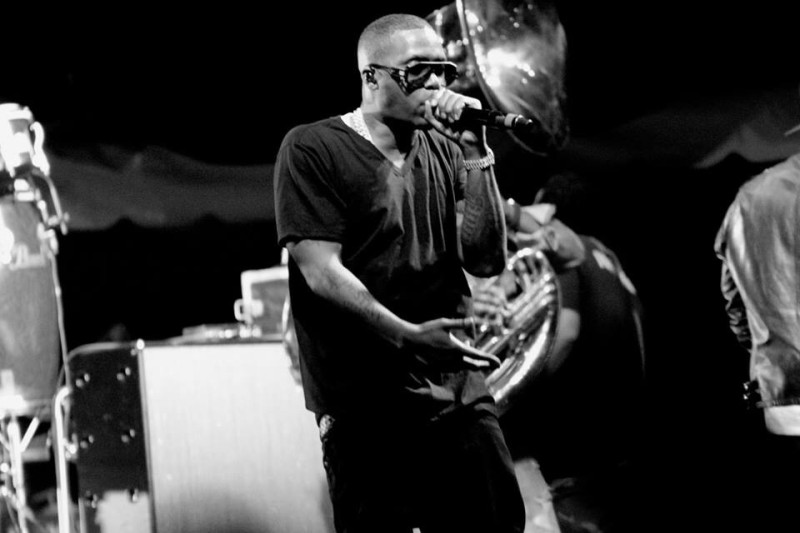
Nas
As someone who grew up amongst an unfortunate overabundance of appreciation amongst my largely caucasian peers for Eminem, and even though I tried to balance it out with NWA, Wu-Tang, and The Roots, I wish I could travel back in time and give myself a copy of Nas’s Illmatic, which I somehow, somehow missed, and how did I miss this? How? Where was I? There is a center of gravity to that album and a situating in that album that you just can’t ignore. I mean: could you imagine every person who did a “Empire State of Mind” parody video doing one for “NY State Of Mind?” (Or — as Nas appropriately changed it during it during his who-needs-a-hype-man-when-I’m-Nas set — “Boston State of Mind?”) Of course not. And that’s the point, albums ‘less than’ Illmatic and “The Takeover” aside.
Though if Illmatic is the album of Queensbridge — if it’s “the” album that helped the other albums happen — then what’s the album that’s the global equivalent of that? There are universals in the specific, sure, but you’ve got Casper in Germany, very political stuff in Brazil, Soosan Firooz in Afghanistan, and others elsewhere — since hip-hop has long since gone global — what would a global Illmatic look like? What would it take to create an album with that kind of situating on a global stage?
One thing that did come to mind that I’m still curious about today — that, as I wandered around the plaza and took in one micro-incident after the other (two bros running through, one saying to the other, ‘I think beer is this way!’; a kid giving the middle finger to his phone, then realizing he, his finger, and his phone were all aligned with me, and saying, ‘Not you’ by way of apologetic explanation), I thought of thesethreereports from a local paper called The Dig describing how the city’s partnership with IBM’s Smarter Cities initiative has led to the deployment of cameras and video analytic software that analyzed “facial patterns, to gauge panic levels and crowd sentiment,” and what that exactly meant.
And then there’s the question Danielle Paquette raised in The Washington Post as to whether or not music festivals can “save your neighborhood,” speaking to one musician who made the terrific point that — though we should be super careful not to look on this as reflexively and thoughtlessly as some urban planners did when they read about Jane Jacobs’s take on the North End — “it’s no shock that Austin, which has the country’s highest number of music venues per capita, is the fastest growing city in America.”
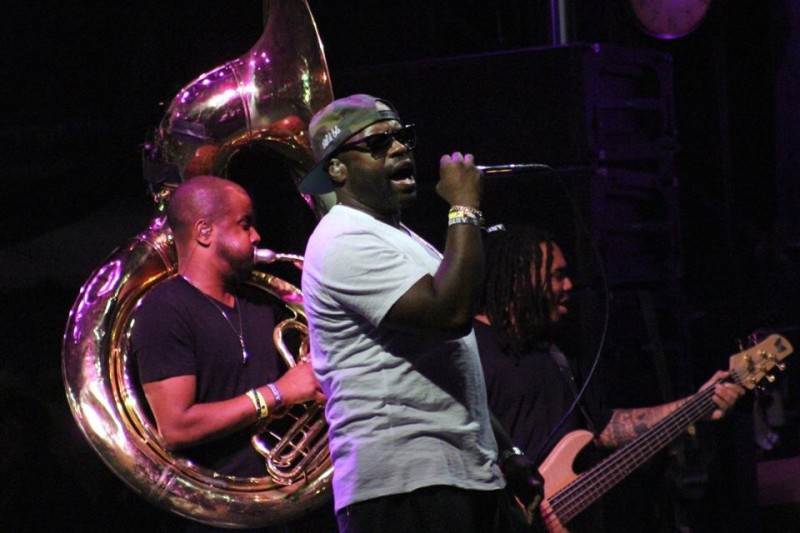
The Roots
Music commands the hell out of the air and disappears into a room. “Boston,” Lorde said, “you have made magic tonight,” and later tweeted that the bands that had been canceled by the storm — Volcano Choir and Girl Talk — were missed and that everyone should have a “big singalong in their honor as [they] walk home”; and maybe they did — maybe there was a rousing chorus that made its way over the wobbly brickwork Americana of Beacon Hill — but I wasn’t there to hear it; maybe they sang about Boston being the place where you’re allowed to be messily in love with the modern world and 128 when it’s dark outside while wandering through “The Massachusetts Student Riviera” known as Allston, but I wasn’t there to see it; or maybe they talked about the fact how Boston’s City Hall has regularly been deemed one of the ugliest buildings in America year after year after year for years, but somewhere between the lightning and the sound crew being cheered whenever the sound crew walked on stage and the kids dancing in the street and the lone airplane making its way overhead during “Seasons (Waiting On You),” it magic pumpkin’d itself. It wasn’t. And that’s all I have to say.
Article by Evan Fleischer. Find him on Twitter @efleischer
All photos courtesy of Maria Zahir




